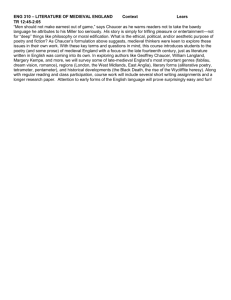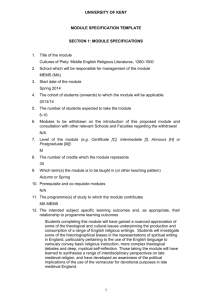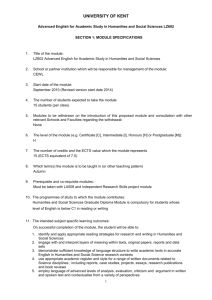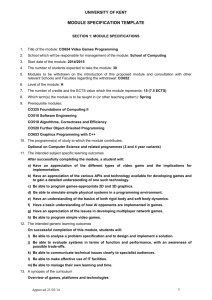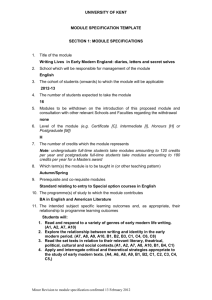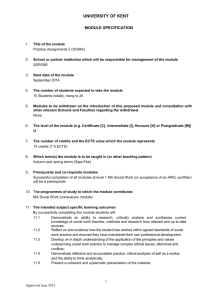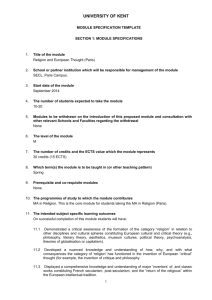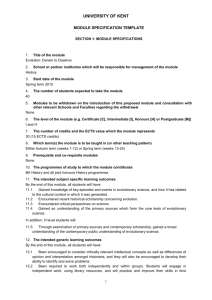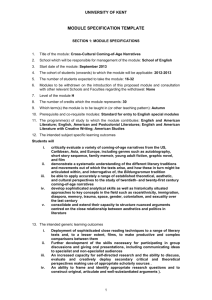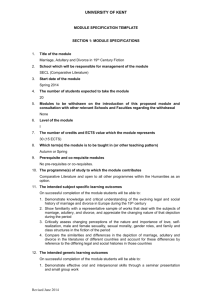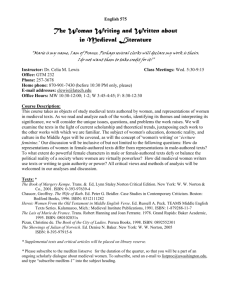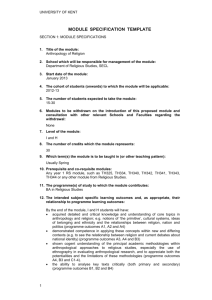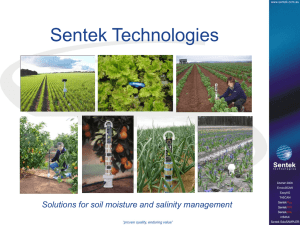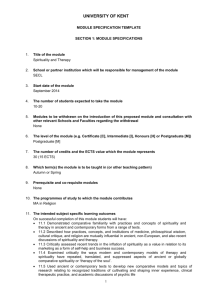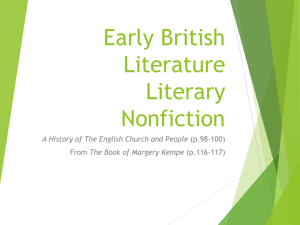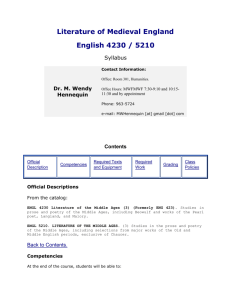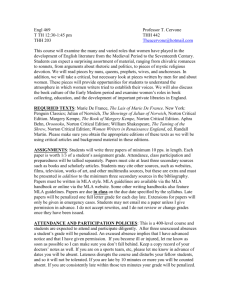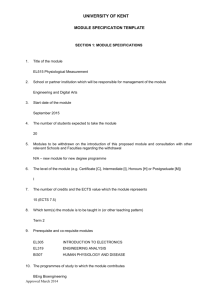Where the module is proposed by a Partner
advertisement
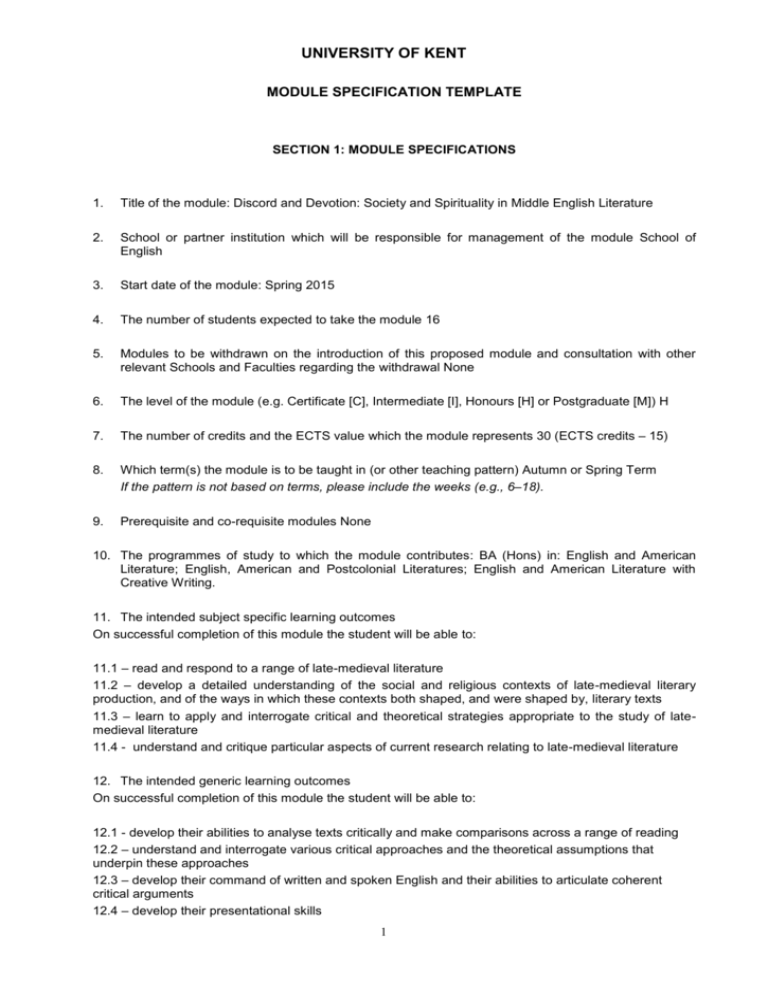
UNIVERSITY OF KENT MODULE SPECIFICATION TEMPLATE SECTION 1: MODULE SPECIFICATIONS 1. Title of the module: Discord and Devotion: Society and Spirituality in Middle English Literature 2. School or partner institution which will be responsible for management of the module School of English 3. Start date of the module: Spring 2015 4. The number of students expected to take the module 16 5. Modules to be withdrawn on the introduction of this proposed module and consultation with other relevant Schools and Faculties regarding the withdrawal None 6. The level of the module (e.g. Certificate [C], Intermediate [I], Honours [H] or Postgraduate [M]) H 7. The number of credits and the ECTS value which the module represents 30 (ECTS credits – 15) 8. Which term(s) the module is to be taught in (or other teaching pattern) Autumn or Spring Term If the pattern is not based on terms, please include the weeks (e.g., 6–18). 9. Prerequisite and co-requisite modules None 10. The programmes of study to which the module contributes: BA (Hons) in: English and American Literature; English, American and Postcolonial Literatures; English and American Literature with Creative Writing. 11. The intended subject specific learning outcomes On successful completion of this module the student will be able to: 11.1 – read and respond to a range of late-medieval literature 11.2 – develop a detailed understanding of the social and religious contexts of late-medieval literary production, and of the ways in which these contexts both shaped, and were shaped by, literary texts 11.3 – learn to apply and interrogate critical and theoretical strategies appropriate to the study of latemedieval literature 11.4 - understand and critique particular aspects of current research relating to late-medieval literature 12. The intended generic learning outcomes On successful completion of this module the student will be able to: 12.1 - develop their abilities to analyse texts critically and make comparisons across a range of reading 12.2 – understand and interrogate various critical approaches and the theoretical assumptions that underpin these approaches 12.3 – develop their command of written and spoken English and their abilities to articulate coherent critical arguments 12.4 – develop their presentational skills 1 UNIVERSITY OF KENT 12.5 – develop their abilities to carry out independent research 13. A synopsis of the curriculum This module will introduce the students to late medieval political understandings of the orders of society and against these stable representations explore the signs that identity and social status were constantly being renegotiated. Through analysing texts such as William Langland’s Piers Plowman, the letters of John Ball, Chaucer’s Canterbury Tales, selected lyrics and a variety of historiographical texts, the course will reveal the ways in which attempts to control social movement were challenged and contested. In a period in which traditional feudal social structures were being supplanted by an emergent proto-capitalist economy, the lower orders were demanding a new political platform and English literature reveals both social aspirations and reactionary anxieties. Paralleling the political tumult is evidence for a growth in diverse forms of spirituality licensing individual devotional practices that similarly challenged the perceived hegemony of the Church. Investigating works like The Book of Margery Kempe among a variety of religious lyrics and plays the module will uncover the growing popularity of affective and mystical devotional forms, which were predicated upon a personal relationship with and experience of the divine. Vernacular writers, such as Julian of Norwich, many Wycliffite authors, and the playwrights of the Croxton Play of the Sacrament, reveal a theological ambition which further problematised orthodox religion in multiple ways. We will examine some of the more sophisticated English spiritual writings that reimagined key theological issues and decentred the Church’s traditional power structures. As part of these reimaginings of orthodox religion women might be empowered as spiritual leaders and official dogma could be subject to lay criticism and intervention. 14. Indicative Reading List Primary The Play of the Sacrament, ed. Sebastian, John T., ed. (Medieval Institute Publications, 2013),) http://d.lib.rochester.edu/teams/publication/sebastian-croxton-play-of-the-sacrament Chaucer, Geoffrey, The Canterbury Tales, ed. Jill Mann (Penguin, 2005) Pearsall, Derek, ed., Chaucer to Spenser: An Anthology of Writings in English, 1375-1575 (Blackwell, 1999) Julian of Norwich, Revelation of Love (in Pearsall) Kempe, Margery, The Book of Margery Kempe (in Pearsall) Langland, William, Piers Plowman (in Pearsall) Secondary Aston, Margaret, Lollards and reformers: images and literacy in late medieval religion (Hambledon Press, 1984) Hudson, Anne, Selections from English Wycliffite Writings (Toronto University Press,1997) Hudson, Anne, The Premature Reformation: Wycliffite texts and Lollard history (Clarendon Press, 1988) Rubin, Miri, Corpus Christi: the Eucharist in late medieval culture (CUP, 1991) Woolf, Rosemary,The English Religious Lyric in the Middle Ages (Clarendon Press,1968) 15. Learning and Teaching Methods, including the nature and number of contact hours and the total study hours which will be expected of students, and how these relate to achievement of the intended module learning outcomes This course will be taught by weekly two-hour seminars plus a further directed hour. Additional time will be devoted by seminar leaders to one-to-one feedback sessions for their students following assessment, and making themselves available for consultation in office hours. These will address subject-specific learning outcomes 11.1, 11.2, 11.3, 11.4, and generic learning outcomes 12.1, 12.2. The module's third hour will supplement the two-hour seminar with a mix of workshops, reading group meetings, lectures and screenings, variously designed to further understanding of the seminar 2 UNIVERSITY OF KENT material. This mixed programme of teaching events will foster independent learning and will encourage creative intellectual engagement with the module materials (11.2, 11.3, 11.4, 12.5). The students are expected to dedicate a total of twenty-five hours per week to this course (300 hours in total). Students will partly be directed in their use of this time by doing prescribed primary reading, but they will also be encouraged to engage in secondary reading to be recorded via a ‘research diary’, and discussed in seminars. The students will be encouraged to develop individual and collaborative presentations, and thus hone research, presentation and communication skills (generic learning outcomes 12.3-5). In addition, the module will offer an intensive study day during which students will be expected to engage with one or more topics from the module in greater depth. 16. Assessment methods and how these relate to testing achievement of the intended module learning outcomes a) Seminar Performance (10%) b) A short essay of 1500 words (15%) c) Completion of a weekly Research Diary (25%) d) Independent Research Project of 3,000 words (50%) In accordance with the intended module learning outcomes, the short essay (b) and the independent research project (d) will both test students’ ability to read and respond to a range of literature (11.1), develop a detailed understanding of contexts (11.2), apply and interrogate critical and theoretical strategies (11.3) and understand and critique current research. In addition, the independent research project will also test students’ abilities to carry out independent research (12.5). Completion of a weekly research diary will test students’ ability to make comparisons across a range of reading, and their growing understanding of different critical and theoretical approaches (12.1 and 12.2); it will also test the development of their ability to conduct independent research. Seminar performance will test all learning outcomes, but especially development of the ability to articulate coherent spoken arguments and their broader presentational skills (12.3 and 12.4). 17. Implications for learning resources, including staff, library, IT and space The course will not make any extraordinary demands on resources. Some new critical works related to the course are likely to be needed for the library, however, the Templeman Library is generally well supplied with appropriate secondary reading for the support of this course. The module will also take advantage of facsimile reproductions of manuscript materials in the Special Collections department. 18. The School/Collaborative Partner recognises and has embedded the expectations of current disability equality legislation, and supports students with a declared disability or special educational need in its teaching. Within this module we will make reasonable adjustments wherever necessary, including additional or substitute materials, teaching modes or assessment methods for students who have declared and discussed their learning support needs. Arrangements for students with declared disabilities will be made on an individual basis, in consultation with the University’s/Collaborative Partner’s disability/dyslexia support service, and specialist support will be provided where needed. 19. Campus(es) where module will be delivered: Canterbury 20. Partner College/Validated Institution: 21. University School responsible for the programme: 3 UNIVERSITY OF KENT SECTION 2: MODULE IS PART OF A PROGRAMME OF STUDY IN A UNIVERSITY SCHOOL Statement by the School Director of Learning and Teaching/School Director of Graduate Studies (as appropriate): "I confirm I have been consulted on the above module proposal and have given advice on the correct procedures and required content of module proposals" ................................................................ .............................................. Director of Learning and Teaching/Director of Graduate Studies (delete as applicable) Date ………………………………………………… Print Name Statement by the Head of School: "I confirm that the School has approved the introduction of the module and, where the module is proposed by School staff, will be responsible for its resourcing" ................................................................. .............................................. Head of School Date ……………………………………………………. Print Name SECTION 3: MODULE IS PART OF A PROGRAMME IN A PARTNER COLLEGE OR VALIDATED INSTITUTION (Where the module is proposed by a Partner College/Validated Institution) Statement by the Nominated Officer of the College/Validated Institution (delete as applicable): "I confirm that the College/Validated Institution (delete as applicable) has approved the introduction of the module and will be responsible for its resourcing" ................................................................. .............................................. Nominated Responsible Officer of Partner College/Validated Institution Date …………………………………………………. Print Name ………………………………………………….. Post …………………………………………. Partner College/Validated Institution Module Specification Template Last updated February 2013 4
